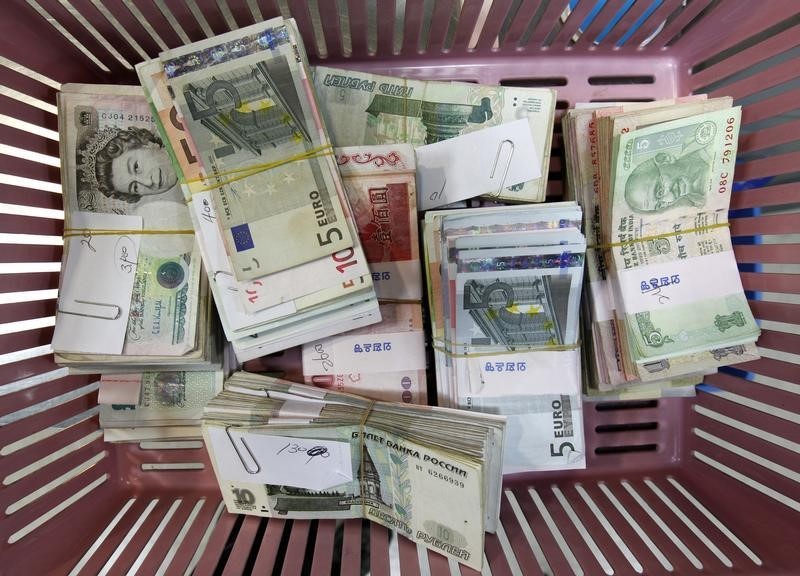* Bank Indonesia to cut interest rates twice this year - ANZ
analysts
* Malaysian ringgit hits two-week low
* BNP Paribas analyst say travel bans to hurt Thai economy
(Adds text, updates prices)
By Anushka Trivedi
May 12 (Reuters) - Most Asian currencies slipped against a
firmer dollar on Tuesday, with the Indonesian rupiah dropping
the most, as fears about a second wave of coronavirus infections
sapped investor confidence.
The Chinese city where the virus originated reported five
new cases on Monday after a stringent lockdown was lifted a
month ago, while easing restrictions in South Korea and Germany
were met by jumps in new infections. China and South Korea's early success in curbing the virus'
spread had brought a semblance of stability to Asian markets
over the past few weeks, however, that is now threatened as "the
strong recovery for these regions will similarly be at risk if a
second wave does strike," IG market strategist Jingyi Pan said.
The rupiah IDR= dropped 0.6% as analysts at ANZ Research
lowered full-year growth forecasts for Indonesia after economic
growth there slowed to its weakest pace since 2001 in the first
quarter.
Worries over a looming coronavirus-induced recession have
weighed on the rupiah this year, making it the worst performing
currency in Asia.
ANZ predicted that Bank Indonesia will deliver two more
interest rate cuts this year, in May and June, to support the
economy.
Other regional currencies were pressured by a stronger
dollar, which was supported by safe-haven demand.
The South Korean won KRW=KFTC weakened 0.5%, marking its
worst day in over a week, while the Malaysian ringgit MYR=MY
dipped 0.1% to a two-week low.
Malaysia reported its sharpest decline in monthly industrial
production index in nearly a decade in the month of March,
government data showed, as virus-related curbs severely
disrupted activity. The Thai baht THB=TH was among the few gainers for the day
as it advanced 0.2%.
A Thai capital market association said late on Monday
investor confidence for three-months to July rose for the first
time this year on optimism about government measures to cushion
the fallout of the pandemic. However, BNP Paribas analysts in a note warned that
Thailand's economic growth will suffer deeply this year due to
global travel bans, as it owes much of its current account
surplus to tourism.
The yuan CNY=CFXS firmed 0.1% against the dollar.
"With China ... expectations for further policy support with
the upcoming National People's Congress (NPC) meeting may help
to shore up prices in the near-term," Pan said.
The NPC is will hold a key annual session on May
22. The following table shows rates for Asian currencies against
the dollar at 0530 GMT.
CURRENCIES VS U.S. DOLLAR
Currency Latest bid Previous day Pct Move
Japan yen 107.410 107.66 +0.23
Sing dlr 1.418 1.4168 -0.06
Taiwan dlr 29.900 29.861 -0.13
Korean won 1226.100 1220.5 -0.46
Baht 32.120 32.19 +0.22
Peso 50.275 50.35 +0.15
Rupiah 14940.000 14850 -0.60
Rupee 75.853 75.74 -0.15
Ringgit 4.334 4.331 -0.07
Yuan 7.093 7.0988 +0.09
Change so far in 2020
Currency Latest bid End 2019 Pct Move
Japan yen 107.410 108.61 +1.12
Sing dlr 1.418 1.3444 -5.16
Taiwan dlr 29.900 30.106 +0.69
Korean won 1226.100 1156.40 -5.68
Baht 32.120 29.91 -6.88
Peso 50.275 50.65 +0.75
Rupiah 14940.000 13880 -7.10
Rupee 75.853 71.38 -5.90
Ringgit 4.334 4.0890 -5.65
Yuan 7.093 6.9632 -1.83
